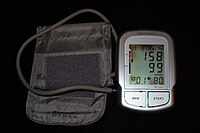
Photo from wikipedia
Background: Whether and to what extent the reported blood pressure (BP) lowering effects of renal denervation (RDN) are associated with a central sympathoinhibition is controversial. We examined this issue by… Click to show full abstract
Background: Whether and to what extent the reported blood pressure (BP) lowering effects of renal denervation (RDN) are associated with a central sympathoinhibition is controversial. We examined this issue by performing a meta-analysis of the microneurographic studies evaluating the BP and muscle sympathetic nerve activity (MSNA) responses to RDN in drug-resistant or uncontrolled hypertension (RHT). Methods: This analysis comprised 11 studies including a total of >400 RHT patients undergoing RDN and were followed up for 6 months. Evaluation was extended to the relationships of MSNA with clinic heart rate and BP changes associated with RDN. Results: MSNA showed a significant reduction after RDN (−4.78 bursts/100 heart beats; P<0.04), which was also accompanied by a significant systolic (−11.45 mm Hg; P<0.002) and diastolic (−5.24 mm Hg; P=0.0001) BP decrease. No significant quantitative relationship was found between MSNA and systolic (r=−0.96, P=0.19) or diastolic BP (r=−0.97, P=0.23) responses to RDN. This was also the case for clinic heart rate (r=0.53, P=0.78, respectively), whose post RDN values were not significant different from the pre-RDN ones. More than 10 renal nerves ablations were found to be needed for obtaining a significant sympathoinhibition. Conclusions: This meta-analysis, the first ever done on the MSNA responses to RDN, shows that in a consistent number of RHT patients RDN is associated with a significant, although modest, central sympathoinhibition, which appears to be unrelated to the BP lowering effects of the procedure. Thus factors other than the central sympathetic outflow inhibition may concur at the BP lowering effects of RDN.
Journal Title: Hypertension
Year Published: 2023
Link to full text (if available)
Share on Social Media: Sign Up to like & get
recommendations!